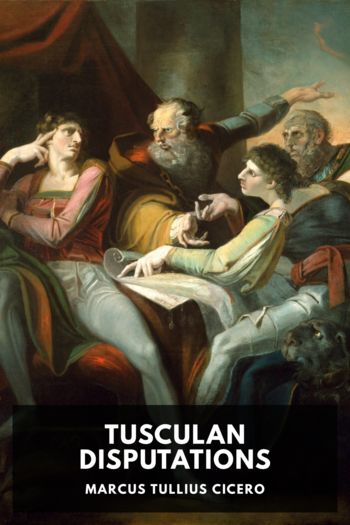Tusculan Disputations - Cicero (red novels TXT) 📗

- Author: Cicero
Book online «Tusculan Disputations - Cicero (red novels TXT) 📗». Author Cicero
I would not die, but yet
Am not concerned that I shall be dead.
The first thing, then, is to inquire what death, which seems to be so well understood, really is. For some imagine death to be the departure of the soul from the body; others think that there is no such departure, but that soul and body perish together, and that the soul is extinguished with the body. Of those who think that the soul does depart from the body, some believe in its immediate dissolution; others fancy that it continues to exist for a time; and others believe that it lasts forever. There is great dispute even what the soul is, where it is, and whence it is derived: with some, the heart itself (cor) seems to be the soul, hence the expressions, excordes, vecordes, concordes; and that prudent Nasica, who was twice consul, was called Corculus, i.e., wise-heart; and Aelius Sextus is described as Egregie cordatus homo, catus Aeliu’ Sextus—that great wise-hearted man, sage Aelius. Empedocles imagines the blood, which is suffused over the heart, to be the soul; to others, a certain part of the brain seems to be the throne of the soul; others neither allow the heart itself, nor any portion of the brain, to be the soul, but think either that the heart is the seat and abode of the soul, or else that the brain is so. Some would have the soul, or spirit, to be the anima, as our schools generally agree; and indeed the name signifies as much, for we use the expressions animam agere, to live; animam efflare, to expire; animosi, men of spirit; bene animati, men of right feeling; exanimi sententia, according to our real opinion; and the very word animus is derived from anima. Again, the soul seems to Zeno the Stoic to be fire.
But what I have said as to the heart, the blood, the brain, air, or fire being the soul, are common opinions. The others are only entertained by individuals, and, indeed, there were many among the ancients who held singular opinions on this subject, of whom the latest was Aristoxenus, a man who was both a musician and a philosopher. He maintained a certain straining of the body, like what is called harmony in music, to be the soul, and believed that, from the figure and nature of the whole body, various motions are excited, as sounds are from an instrument. He adhered steadily to his system, and yet he said something, the nature of which, whatever it was, had been detailed and explained a great while before by Plato. Xenocrates denied that the soul had any figure, or anything like a body, but said it was a number, the power of which, as Pythagoras had fancied some ages before, was the greatest in nature. His master, Plato, imagined a threefold soul, a dominant portion of which—that is to say, reason—he had lodged in the head, as in a tower; and the other two parts—namely, anger and desire—he made subservient to this one, and allotted them distinct abodes, placing anger in the breast, and desire under the praecordia. But Dicaearchus, in that discourse of some learned disputants, held at Corinth, which he details to us in three books—in the first book introduces many speakers, and in the other two he introduces a certain Pherecrates, an old man of Phthia,





Comments (0)